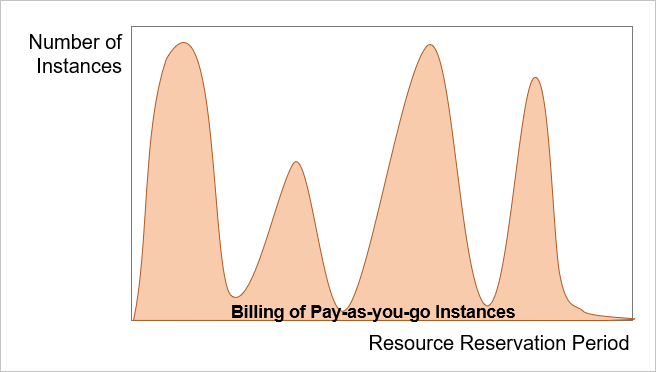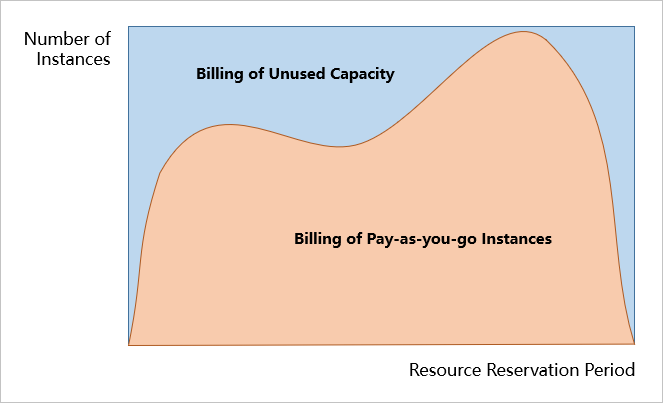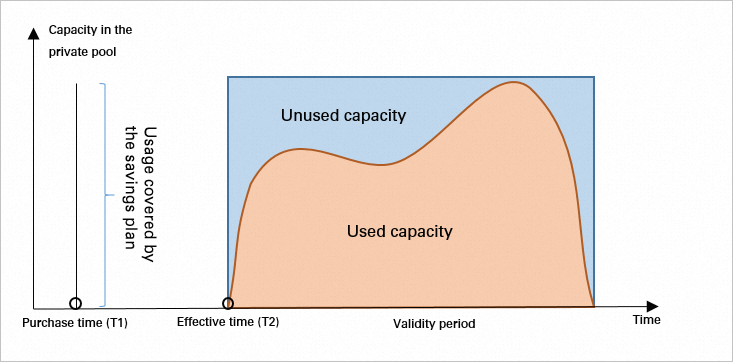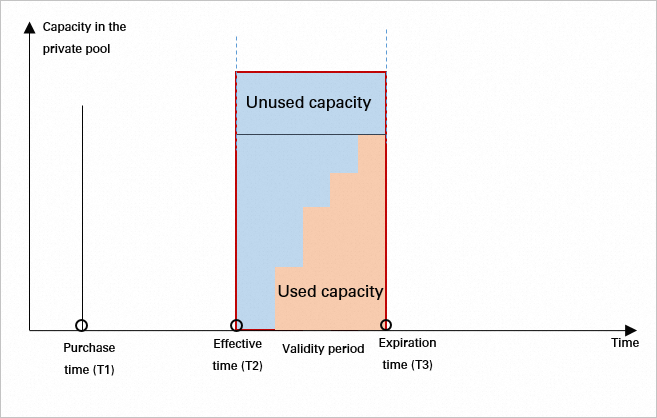Resource Advisor is an end-to-end service that helps you optimize Elastic Compute Service (ECS) resource usage. Resource Advisor allows you to make resource plans beforehand and reserve resources to obtain capacity assurance. Resource Advisor also monitors and analyzes resource configurations and usage telemetry and provides actionable recommendations on how to optimize your resource usage. Resource Advisor helps you use the cloud in an efficient, cost-effective, and secure manner.
Resource planning
When you plan to migrate your business to the cloud, resource planning helps you determine the resources to be used and the purchase methods of the resources based on your business requirements.
Feature | Description |
Provision health score | Provision health scores indicate the real-time availability of ECS instance types in terms of the stock level, replenishment capability, and popularity. Before you migrate on-premises servers to the cloud, plan your resources based on the provision health scores. For more information, see View the provision health scores of resources. |
Resource specifications recommendation |
For more information, see Obtain recommendations on resource schemes. |
Resource Assurance
Resource Assurance is a service that can help guarantee the provision of ECS resources as your business requirements change. Resource Assurance allows you to quantify available resources, reserve resources, plan private pools, and gain a better experience when you query, reserve, purchase, and use resources.
Resource Assurance provides Resource Reservation and Private Pool. The following table describes the services and their features.
Service | Feature | Description |
| Allows you to reserve resources for different scenarios. After you purchase an elasticity assurance or capacity reservation, Alibaba Cloud reserves resources that match the attributes of the elasticity assurance or capacity reservation in a private pool. | |
Private Pool | Provides guaranteed access to resources for you to create instances. |
Resource Reservation
You can purchase resource reservations to ensure that resources are in place to meet your business requirements. Resource reservations are classified into the following types based on usage scenarios:
Elasticity assurances: suitable for scenarios in which resource demand patterns are highly irregular. Elasticity assurances provide guaranteed access to resources only for pay-as-you go instances. Elasticity assurances can take effect immediately after creation or at the specified time. For more information, see Elasticity Assurance.
Capacity reservations: suitable for scenarios in which resource demands are stable and high. Capacity reservations are classified into different types. Capacity reservations provide guaranteed access to resources for subscription and pay-as-you-go instances. Capacity reservations can take effect immediately after creation or at the specified time. For more information, see Overview of immediate capacity reservations and Overview of scheduled capacity reservations.
Resource reservations do not provide guaranteed access to resources for spot instances.
The following figure shows the classification of resource reservations.

When you use resource reservations, configure an appropriate resource reservation plan based on your requirements for usage scenarios, resource types, and effective time. The following table compares different plans.
Item | Elasticity assurance | Immediate capacity reservation | Capacity reservation with Savings Plan | Capacity reservation for subscription resources |
Usage scenario | Resource usage shows discrete spikes over time, but the overall resource usage is not high, as shown in the following figure. Instances are released when no longer needed and then created again later. Elasticity assurances are suitable for the following scenarios:
| The overall resource usage is stable and high, as shown in the following figure. Instances are released when no longer needed and then created again later. Immediate capacity reservations are suitable for the following scenarios:
| The overall resource usage is stable and high, as shown in the following figure. Instances are released when no longer needed and then created again later. Capacity reservations with Savings Plan are suitable for scenarios in which data is migrated to the cloud, and you must reserve resources in order to perform occasional system upgrades after migration. Instances are released when no longer needed and then created again later. | The overall resource usage is stable and high, as shown in the following figure. Instances do not need to be released and then created again. Capacity reservations for subscription resources are suitable for scenarios in which resources need to be filed. |
Resource attribute |
|
|
|
|
Supported resource | Pay-as-you-go instance | Pay-as-you-go instance | Pay-as-you-go instance | Subscription instance |
Time flexibility |
|
|
|
|
Fee | One-off assurance fee + Fee for created pay-as-you-go instances. |
| Fee for the associated No Upfront savings plan + Fee for created pay-as-you-go instances (which is offset by the associated No Upfront savings plan) + Fee for unused reserved capacity (which is billed at the equivalent pay-as-you-go instance type rate and offset by the associated savings plan). | Fee for created subscription instances + Fee for unused reserved capacity (which is billed at the equivalent pay-as-you-go instance type rate for 7 days). Note You cannot use capacity reservations for subscription resources to create pay-as-you-go instances. |
Cost optimization | If you purchased regional reserved instances or savings plans, you can apply them to created pay-as-you-go instances. | If you purchased regional reserved instances or savings plans, you can apply them to the unused reserved capacity and created pay-as-you-go instances. | When you create a capacity reservation with Savings Plan, you must create a savings plan at the same time. This savings plan is applied to provide savings on the resources that are reserved by the capacity reservation. Note If you release a capacity reservation with Savings Plan, the savings plan can continue to be applied to reduce your bill on resources, but cannot be used to create another capacity reservation with Savings Plan. | None. Note Regional reserved instances or savings plans cannot be applied to the unused reserved capacity of capacity reservation for subscription resources. |
Regional reserved instances can provide reserved resources but cannot be applied to resources that are reserved by resource reservations.
Private Pool
Resources that are automatically scheduled constitute a public pool. All users have access to the resources in the public pool. Instances may fail to be created when resources in the public pool are insufficient. When you purchase a resource reservation, Alibaba Cloud reserves resources that have matching attributes in a private pool for your use to create instances.
The capacity in private pools is displayed as reserved quotas, which allows you to see your guaranteed resources. For information about how to view reserved quotas, see View and increase instance quotas.
You can purchase resource reservations based on your planned needs, which create private pools to accommodate reserved instances. Then, you can use the reserved resources in the private pools to create instances. You can perform the following private pool-related operations:
When you purchase an elasticity assurance or capacity reservation, you can configure private pool attributes:
Private pool type: open or targeted private pool. Open private pools are suitable for business that requires the guaranteed provision of resources. You can use an open private pool of your choice by specifying the ID of the private pool or by matching the tags of the elasticity assurance or capacity reservation associated with the private pool. Alternatively, you can use an open private pool that is selected by the system. Targeted private pools are suitable for critical business that requires dedicated reserved resources. To use a targeted private pool, you must specify the ID of the targeted private pool.
Tag matching: You can enable tag matching to use open private pools based on tags.
For example, you developed a script to create instances that have specific tags for your critical business. If your critical business requires guaranteed provision of resources, purchase an elasticity assurance or capacity reservation. When you purchase the elasticity assurance or capacity reservation, set the private pool type to Open and add the instance tags specified in the script. After the elasticity assurance or capacity reservation is purchased, tag matching is automatically enabled for the associated open private pool. When you run the script to create instances, the associated open private pool is automatically matched and used. This eliminates the need to modify the instance creation script and reduces unnecessary communication and O&M costs.
For more information, see Purchase a resource reservation.
When you create instances, use one of the following methods to configure the private pool that you want to use:
Specify the ID of an open or targeted private pool.
Add tags to use the open private pool that is associated with an elasticity assurance or capacity reservation that has the same tags.
Set the private pool type to Open to use an open private pool that is selected by the system.
For more information, see Use a private pool to create instances.
The following figure shows the workflow for creating and using private pools.

Alibaba Cloud utilizes the capacity of private pools as much as possible.
When you purchase elasticity assurances or capacity reservations, Alibaba Cloud takes the instances that you have into account when evaluating whether the current resource inventory can meet your business requirements.
For example, you have 100 pay-as-you-go instances and you want to release the instances and create new instances. When you attempt to purchase a capacity reservation to reserve resources, your purchase request is denied due to insufficient resources. To resolve the preceding issue, you can set the private pool type of your existing Spot Instances to Open. This way, the instances are considered as matchable resources. Then, you can purchase a capacity reservation.
After a private pool is created, the private pool is automatically used by existing instances that match the attributes of the private pool.
NoteOnly private pools for pay-as-you-go instances can match existing instances. Private pools for subscription instances can be used only to create instances.
If instances no longer match a private pool after instance attributes, such as the instance type and operating system, are changed, the system checks the instances and matches the instances to other private pools.
The following section describes some scenarios for which private pools are suitable:
Resources allocated based on business types
A system administrator creates multiple targeted private pools and informs O&M personnel and developers of different pool IDs. This ensures that different private pools are used to create instances for O&M and development needs.
Resources allocated for all business types
A system administrator creates open private pools. O&M personnel and developers use the reserved resources in the open private pools to create instances. When the reserved resources in the private pools are exhausted, resources in the public pool are used.
Resources allocated based on tags
A system administrator creates open private pools and adds business-specific tags to the open private pools. When you create instances for a specific business, add tags to the instances. The instances automatically match the open private pools that have the same tags.
ImportantUse the tag-based grouping feature for private pools with caution. When the cloud resource inventory is low, this feature can prevent an instance from being removed from the private pool. This can result in an incorrect display of the private pool's available capacity.
Resources allocated exclusively to specific business
A system administrator creates targeted private pools and allows you to use the targeted private pools to create instances only for specific business. When the reserved resources in the private pools are exhausted, no more instances can be created.
Optimization suggestions
After resources are created, Resource Advisor can provide suggestions based on the CPU utilization and memory usage of ECS instances to help optimize the performance of the instances. You can obtain solutions based on the suggestions.
You can also analyze Resource Creation Failures to obtain solutions to successfully create resources.



